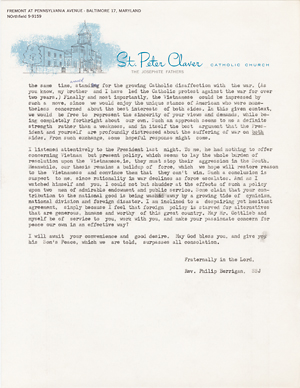 |
Letter from Philip Berrigan to Dean Rusk, January 11, 1967
 |
3 / 3 |
 |



| Collection: |
Cornell University Library |
| Date: |
1967-01-11 |
| Date of Digitization: |
2004 |
| Source: |
Daniel and Philip Berrigan Collection at the Division of Rare and Manuscript Collections, Cornell University Library |
| Original Dimensions: |
? |
| Creator: |
Berrigan, Philip, 1923-2002 |
|
|
Description:
In the letter to Secretary of State, Dean Rusk, Philip Berrigan discusses the political situation caused by the war in Vietnam, the wrongness and immorality of war. He urges Secretary Rusk to give peace a chance and offers his service as a possible emissary to meet Ho Chi Minh and start talks on ending the war.
Transcription: the same time, would stand for the growing Catholic disaffection with the war. (As
you know, my brother and I have led the Catholic protest against the war for over
two years.) Finally and most importantly, the Vietnamese could be impressed by
such a move, since we would enjoy the unique stance of American who were none-
theless concerned about the best interests of both sides. In this given context,
we would be free to represent the sincerity of your views and demands, while be-
ing completely forthright about our own. Such an approach seems to me a definite
strength rather than a weakness, and in itself the best argument that the Pres-
ident and yourself are profoundly distressed about the suffering of war on both
sides. From such exchange, some hopeful response might come.
I listened attentively to the President last night. To me, he had nothing to offer
concerning Vietnam but present policy, which seems to lay the whole burden of
resolution upon the Vietnamese, ie, they must stop their aggression in the South.
Meanwhile, our thesis remains a buildup of force, which we hope will restore reason
to the Vietnamese and convince them that they can't win. Such a conclusion is
suspect to me, since rationality in war declines as force escalates. And as I
watched, himself and you, I could not but shudder at the affects of such a policy
upon two men of admirable endowment and public service. Some claim that your con-
tribution to the national good is being washed away by a growing tide of cynicism,
national division and foreign disaster. I am inclined to a despairing yet hesitant
agreement, simply because I feel that foreign policy is starved for alternatives
that are generous, humane and worthy of this great country. May Mr. Gottlieb and
myself be of service to you, work with you, and make your passionate concern for
peace our own in an effective way?
I will await your convenience and good desire. May God bless you, and give you
his Son's Peace, which we are told, surpasses all consolation.
Fraternally in the Lord,
Rev. Philip Berrigan, SSJ
|




